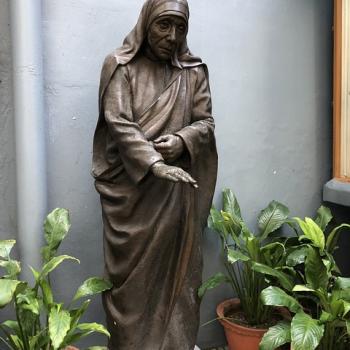Now Featured at the Patheos Book Club
Getting Into Heaven—and Out Again
ByAlbrecht H. Gralle/Translated by Friederike Gralle / Illustrated by Sally Blakemore
In Getting into Heaven—and Out Again, novelist Albrecht H. Gralle, a native of Germany, tone, the book takes on some heavy questions about faith in an increasingly skeptical world. We asked the author to share his experiences in writing the book.
LOGOS: How did you get the idea to write this book?
AHG: Around the age of ten, I started to reflect on heaven and life after death. Later on, as I studied theology in Hamburg, I got deeper into the subject. It was an eye-opener when I came into contact with the ideas of Sadhu Sundar Singh and later with Swedenborg's heaven and hell.
In 1993, I started writing books full-time. One day, in 2005, I was standing in the kitchen asking myself: What would people really like to know? What would be a burning issue for them? And then the answer was clear: The most important thing is where we will spend eternity. And so the book was born.
LOGOS: As an author, you made an unusual choice—you made the reader the main character rather than inventing a fictional person to take this journey through the afterlife. Why did you decide to use that approach?
AHG: From the start I didn't want to present a dry study, but rather an exciting story. I wanted the style to correspond to the lightness of heaven and build up a kind of easy relationship with the reader. So I came up with the idea of a dialog with the reader, approaching the reader directly. In this way I could also put a lot of humorous remarks in it.
LOGOS: Many of your descriptions of heaven and hell are taken from Swedenborg's writings, but there are also some things that are different—for example, the tents where people who have experienced great trauma on earth are given time to rest and recover. Where did those ideas come from?
AHG: I had a vaguely remembered idea of these tents from one of George McDonald's books. He was the spiritual teacher of C. S. Lewis. In his novel Lilith there is a scene where the dead lie in big, comfortable beds and rest, dreaming about their lives. I changed the scene a little bit. Instead of a huge house I used a tent and put more comfort into the individual sleeping places.
Since I work as a counselor for emergency patients—in German we call it a Notfallseelsorge—I always thought that there must be something in the spiritual world where people who had gone through terrible experiences could relax when they first arrive.
LOGOS: You were originally a Baptist minister, and as part of that job you lived in Sierra Leone for a while. When and where did you first come across Swedenborg? How did his writings affect you?
AHG: In 1986 we came back from Sierra Leone, where we had worked within the Baptist Convention, my wife as an ophthalmologist and I as a theological teacher. We lived for one year in Bremerhaven—North Germany—where I visited churches, showing slides about Sierra Leone and the church work there. During this year I wrote a short book about a guardian angel named "Co," who started a diary when he had to supervise a man called Bertram. The book was called Bertram & Co. I was searching in the library for more information about angels. I came across Swedenborg's books and was fascinated, because the things he was writing about were logical, self-evident, and unique. As I read I said to myself, well, that's exactly what I've always thought. Since then I've tried to read as many of his writings as I could.
LOGOS: Throughout the book, you talk about spiritual questions that may lead people to question whether or not there is a God—for example, the leap of faith required to believe in something you can't see and touch. Have you had those same questions?
AHG: Of course! During my studies and even before, I allowed myself to ask all these doubting questions: Does God exist? Is life after death a fairy tale or not? Can we trust the Bible? . . . and so on. I found it refreshing that Swedenborg is so scientific in these matters and reasons everything through, very unlike a typical mystical author.
LOGOS: What audience did you have in mind when you wrote this book, and what do you hope they will get out of it?
AHG: My audience is readers who are open to spiritual questions in general—not only Christians, but also atheists who have a hidden longing for more, and people from other religions who still have questions.




